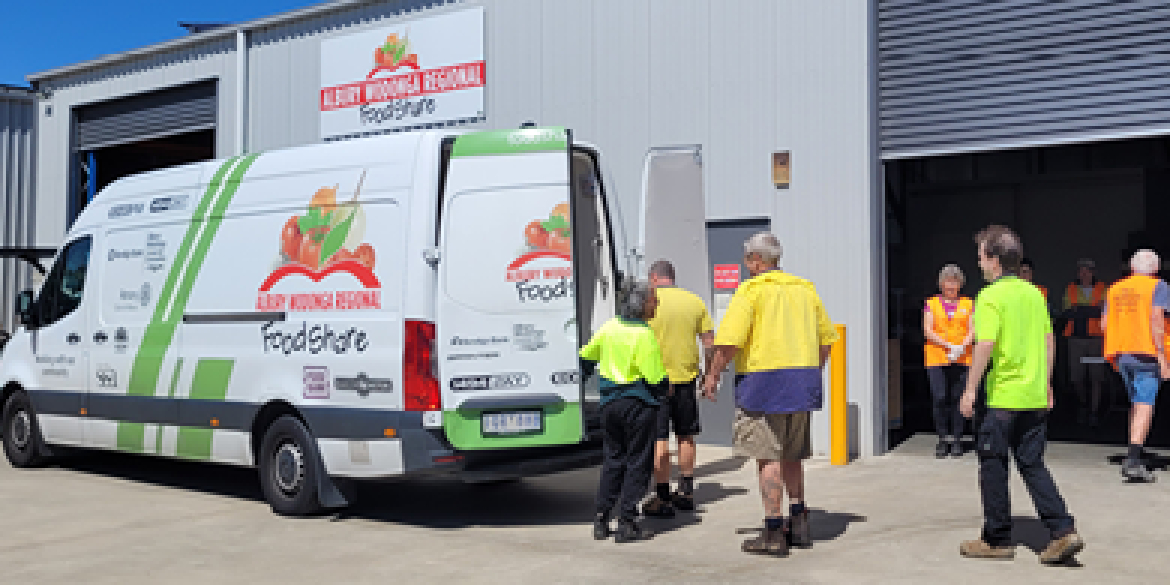FoodShare's Feed More Waste Less initiative is being expanded across North East Victoria and into Southern NSW, improving access to rescued food for thousands of individuals and families in communities hit hard by natural disasters and the rise in cost of living.
Following an injection of $58,000 in funding from Sustainability Victoria in 2022 through the Circular Economy Communities Fund, the Feed More Waste Less project has unearthed several new ways to divert and manage waste while helping vulnerable Victorians.
To date, this program has diverted 1,562,000 kilograms of non-consumable food rescued from landfill by partnering with local recycling, composting, and farming operations to process non-edible food. A further 102,303 kilograms was composted, recycled, or repurposed through sustainability initiatives.
The funding from Sustainability Victoria enabled FoodShare to employ a dedicated Project Coordinator to grow the network of food donors and expand FoodShare’s capacity to sort and redistribute food for residents who are experiencing financial hardship.
“FoodShare has been a lifeline for countless individuals and families who struggle to eat nutritious meals,” said Katrina Pawley, CEO of Albury Wodonga Regional FoodShare.
“Our programs extend far beyond just providing food; it is about nourishing bodies, fostering community, and offering hope to those who need it most.”
Last financial year alone, FoodShare distributed 504,000 kilograms of food relief equating to 1 million meals, which was shared with 110 partner organisations across nine local Victorian government areas, including Wodonga, Alpine, Moira, Indigo, Towong, and Wangaratta, as well as three local government areas in New South Wales.
FoodShare’s Community Pantry now supports more than 1,500 people every month making it a worthy winner of the Outstanding Community Organisation Category at the recent Albury Wodonga Business Awards.
“I couldn’t do without FoodShare. I was stretching out my food over the days before I get paid again, but now I can eat healthy food and the money I save on groceries allows me to pay other bills,” said one of the FoodShare recipients.
Moreover, FoodShare’s circular model has generated significant social value, with 200 active volunteers providing more than 27,583 volunteer hours, equivalent to $1.2 million in volunteer contributions.
In response to growing demand, FoodShare is preparing to expand to Wagga Wagga and is now receiving additional support through the NSW EPA.
Matt Genever, Sustainability Victoria’s CEO, described the project as a leading example of what a community-focused circular economy looks like in action.
“Feed More Waste Less has not only increased the amount of food rescued from supermarkets, local producers, farmers and businesses, it has reduced poverty and supported some of the most vulnerable people in our communities.”
The Feed More Waste Less project is one of 60 initiatives supported by the Circular Economy Communities Fund, which has invested $5.1 million in pioneering Victorian projects since launch.
“The Circular Economy Communities Fund was the first of its kind. There were no historical benchmarks, no templates – just an ambitious vision to empower local communities to lead waste reduction efforts. And it worked,” said Mr Genever.
Funded community groups have developed their own creative solutions for reducing waste and, since 2021, these organisations have collectively surpassed targets for waste diversion, participation, and volunteer hours.
“Together, these community groups have diverted more than 3,140 tonnes of waste that would otherwise have gone to landfill, formed 346 new partnerships, and volunteers have donated 133,354 hours to making sure the funded projects were successful. It’s a fantastic outcome,” said Mr Genever.

